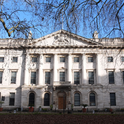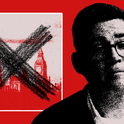We, at least I, have been here before. As the new year begins, the Conservative government is stumbling towards the end of a long period in power. We have a recently appointed prime minister that nobody voted for; a revived Labour party, keen to win; arguments about Britain’s relations with the rest of Europe; tough economic decisions awaiting the new government; the prospect of election campaigns at the same time on both sides of the Atlantic; a Democratic president facing a right-wing Republican.
The general election of October 1964 is the first I remember clearly. Alec Douglas-Home, a mild-mannered earl, was the last Tory leader to be chosen by the party’s mysterious “magic circle” meeting privately behind closed doors. He used a new law to renounce his peerage as it was no longer acceptable for the prime minister to sit in the House of Lords. (Pub quiz aficionados might note that he was the last PM not to be a member of the House of Commons at the time of his appointment: he became an MP three weeks later at a byelection.)
Labour’s Harold Wilson had been elected by his party’s MPs, decisively but not overwhelmingly. He talked more about modernisation than ideology. As Britain entered 1964 there was a palpable sense of a changing of the guard, albeit with some scepticism about how much difference it would make. The BBC’s satirical show That Was The Week That Was depicted the coming battle between Home and Wilson as “Dull Alec” versus “Smart Alec”.
At the start of the year, Labour seemed set for a comfortable victory. It had spent almost all of 1963 with double-digit lead in the polls, rising to 20 per cent at its peak. It started to dip in the new year, but with just weeks to go until election day, one Gallup survey showed Labour still 8.5 per cent ahead, almost as big a lead as the party had achieved in its 1945 landslide victory.
When the election date, 15th October, was announced, it meant that British voters would be going to the polls just 19 days before the Americans. Barry Goldwater, the Republican candidate, relished being called a right-wing extremist. At the party convention that confirmed his candidacy, he said: “I would remind you that extremism in the defence of liberty is no vice! And let me remind you also that moderation in the pursuit of justice is no virtue!”
In recent months, it has been suggested that there are risks to the international order in 2024 from the two democracies having uncertain futures at the same time. I recall no such fears being expressed 60 years ago, even though the Cold War was at its height. For the record, we should note that on the day of Britain’s 1964 election, a palace coup in Moscow deposed Nikita Khruschev as Soviet leader—and the very next day, China exploded its first nuclear bomb. The world survived this heady mixture of drama and uncertainty.
If there are parallels in the run-up to the elections then and now, what about their consequences? Here are three things that happened then could be relevant this time.
First, Labour’s lead narrowed in the weeks leading up to the 1964 election. It ended up less than two points ahead of the Conservatives, and an overall majority of just four. A byelection defeat three months later halved that to two. Wilson called a second general election in March 1966, which Labour won with a majority of 98.
Second, Britain’s public finances were in a mess. Clearing his desk at the Treasury on the day after the election, Reginald Maudling, the outgoing Tory chancellor, apologised to James Callaghan, his Labour successor for the state of the economy: “Sorry old cock, to leave it in this shape.” There was a strong case for devaluing the pound to dig the country out of its hole. Wilson, remembering that the previous decision to reduce the value of the pound had been taken by the Attlee government in 1949, feared Labour being tagged as the devaluation party. His first major decision as prime minister was to maintain the pound at $2.80.
Loans from abroad tided him over, so that the economy seemed to be in reasonable condition at the time of the 1966 election. But within weeks of that second election, a full-blown crisis forced Labour into unpopular spending cuts. Again, these helped for a while, but in November 1967 Wilson and Callaghan bowed to the inevitable and finally devalued the pound. Labour never recovered from the political humiliation, and went on to lose the 1970 election. Had the decision been taken straight after the 1964 election and been blamed on the Tories’ mismanagement of the economy, the story of the 1964-70 government might have been very different. If tough decisions must be taken by an incoming government, the sooner the better.
Third, Labour’s pre-election policy on Europe changed markedly once the party was in government. It had opposed the Conservatives’ failed bid to join the common market. Its 1964 manifesto confirmed this position: “Though we shall seek to achieve closer links with our European neighbours, the Labour Party is convinced that the first responsibility of a British Government is still to the Commonwealth.”
By 1966, Wilson was convinced that it was no longer enough for Britain to be part of the European Free Trade Association ring of mainly smaller countries outside the common market. His 1966 manifesto said: “Labour believes that Britain, in consultation with her EFTA partners, should be ready to enter the European Economic Community, provided essential British and Commonwealth interests are safeguarded.”
In the end, Wilson failed to take Britain into the common market; but perhaps the relevant point for today is that his shift to a distinctly pro-European stance after 1964 did Labour no harm in the 1966 election.













